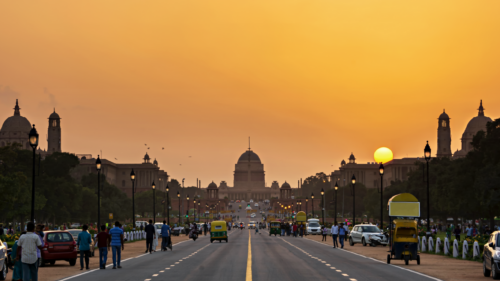
Delhi Propels Final-Mile Deliveries in Bid to Become India’s Electric Vehicle Capital
Achieving 100% electric vehicle sales penetration for final-mile delivery vehicles in Delhi by 2030 can significantly improve air quality and positively impact health, by greatly reducing CO2, 12,370 NOx, and particulate matter emissions.
New Delhi, India
A new report by the Dialogue and Development Commission of Delhi (DDC–D), RMI, and RMI India, offers a novel on-the-ground analysis of fleet electrification efforts in Delhi. The report, titled, Roadmap for 100% Delivery Electrification in Delhi: Unlocking Insights from the Deliver Electric Delhi Pilot, assembles findings from electric delivery deployment and the implementation of the Deliver Electric Delhi pilot.
To help Delhi accelerate the electrification of final-mile delivery vehicles, the Deliver Electric Delhi pilot was designed to facilitate public and private sector partnerships and improve policy and business decision-making related to EV adoption.
Within just over a year of enacting the Delhi EV policy and implementing the Deliver Electric Delhi pilot, EV sales in Delhi increased from 3.3 to 10 percent of new vehicles registered. This success can be attributed to the following actions taken by the Delhi Government and its strategic partners:
- Public and private sector collaboration: The Delhi government adopted a consultative approach to designing and implementing the Delhi EV policy. Public and private sector feedback was collected throughout the Deliver Electric Delhi pilot to better iterate on policy design and execution.
- Demand-side policies: A purchase and scrappage incentive, in addition to FAME II subsidies, lowered the capital cost of EVs by 25 percent. The government also enacted regulatory measures to incentivize EV use and provide an operational edge over internal combustion delivery vehicles.
- A robust EV charging system: To increase charging infrastructure availability throughout the city, the Delhi government enacted a series of schemes and processes to defray charging infrastructure costs. The government took a technology-agnostic approach to scale charging infrastructure, providing incentives to foster both battery swapping and more conventional plug-in charging infrastructure development.
Discussing the recently released report, DDC-D Vice Chairperson Jasmine Shah, said, “The evolution of Delhi’s Electric Vehicle policy 2020 was strongly rooted in consultations and continuous discussions with all stakeholders and it is their enthusiastic participation that led to the framing of a very robust policy that was welcomed by all in the EV ecosystem.”
Highlighting the progressive EV Policy, Minister of Transport Kailash Gahlot, Government of NCT of Delhi, stated, “The Delhi Government has given the right incentives to bring together an entire electric vehicle ecosystem.” He added that, “It is now the turn of Residents’ Welfare Associations, commercial establishment owners, and citizens to play their crucial roles in creating awareness and adding more EV charging infrastructure.”
Speaking on the outcomes of the stakeholder consultations, RMI India Managing Director Akshima Ghate said, “The Delhi government’s commitment and effort towards ensuring a consultative process throughout the EV policy formulation and implementation process is unprecedented. Platforms like the Delhi EV Forum, Delhi Urban Mobility Lab, Deliver Electric Delhi pilot, and campaigns like Switch Delhi have ensured that every stakeholder gets an opportunity to participate in Delhi’s EV journey.”
The report was officially released at the third Delhi EV Forum, co-hosted by DDC-D and RMI India on April 19, 2022, in New Delhi, India.
For more details, please contact Jyoti Kalash at jyoticmulf@gmail.com and Dimpy Suneja at dsuneja@rmi.org
About Dialogue and Development Commission of Delhi
The Dialogue and Development Commission of Delhi (DDC-D) is the policy think tank of the Government of the National Capital Territory (NCT) of Delhi and advises the government on finding sustainable, people-centric solutions to the critical development challenges faced by Delhi.
About RMI
Rocky Mountain Institute (RMI) is an independent, nonpartisan nonprofit founded in 1982 that transforms global energy systems through market-driven solutions to secure a prosperous, resilient, clean energy future for all. In collaboration with businesses, policymakers, funders, communities, and other partners, RMI drives investment to scale clean energy solutions, reduce energy waste, and boost access to affordable clean energy in ways that enhance security, strengthen the economy, and improve people’s livelihoods. RMI is active in over 60 countries.
About RMI India
RMI India is an independent think-and-do tank that works with diverse stakeholders. It takes inspiration from and collaborates with RMI, a 40-year-old non-governmental organization. RMI India’s mission is to accelerate India’s transition to a clean, prosperous, and inclusive energy future.
More information about RMI and RMI India can be found at www.rmi.org.